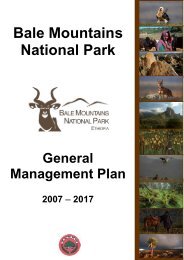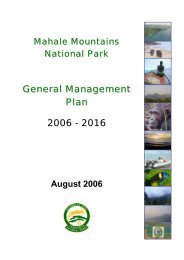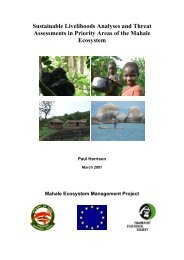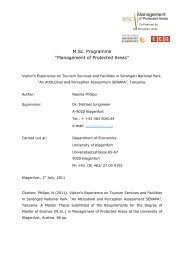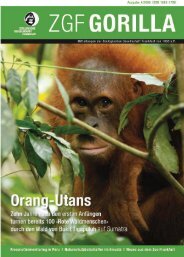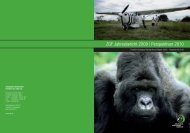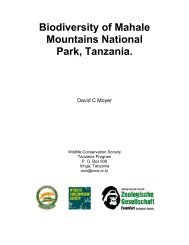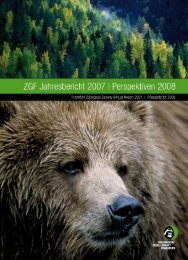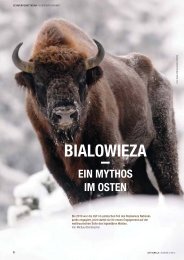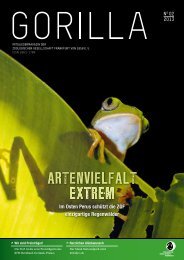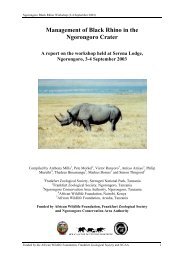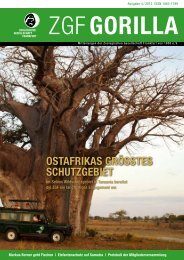Walia Special Edition on the Bale Mountains (2011) - Zoologische ...
Walia Special Edition on the Bale Mountains (2011) - Zoologische ...
Walia Special Edition on the Bale Mountains (2011) - Zoologische ...
Create successful ePaper yourself
Turn your PDF publications into a flip-book with our unique Google optimized e-Paper software.
available in <strong>the</strong> market because of its high demand. Taking <strong>the</strong> estimated ratio of 75:25 given by<br />
intermediaries, for <strong>the</strong> two sizes and assuming <strong>the</strong> medium and thin sized culms are obtained from<br />
<strong>the</strong> same bamboo culm, <strong>the</strong> amount of bamboo coming to Goba each market day is estimated to<br />
be between 21,600–28,800 culms (<strong>on</strong> average 201,600 culms/m<strong>on</strong>th). There is ano<strong>the</strong>r group of<br />
communities coming from a neighbouring kebele – Adaba Gefecha. They, however, represent few in<br />
number and <strong>on</strong>ly 20% of interviewees at <strong>the</strong> market site. Taking <strong>the</strong>se harvesters into c<strong>on</strong>siderati<strong>on</strong>,<br />
<strong>the</strong> total amount of bamboo coming from Shedem is 17,280–23,040 culms per market day. The<br />
average value of bamboo at this stage is 1 ETB/culm.<br />
Since harvesters transport <strong>the</strong> culms from a remote resource site to a town where people can<br />
buy and use <strong>the</strong>m <strong>the</strong>y are an integral part of <strong>the</strong> value chain. However, <strong>the</strong>y see <strong>the</strong>ir lack of skill<br />
as an obstacle to being able to add a higher ec<strong>on</strong>omic value to bamboo.<br />
Intermediaries<br />
Intermediaries are people who buy <strong>the</strong> culms from <strong>the</strong> Goba market and transport <strong>the</strong>m to larger<br />
nearby towns such as Robe, Agarfa, Gasera, Jara, and Ginir to sell <strong>the</strong>m at a higher price. In Robe <strong>the</strong><br />
average price per culm was 1.10 ETB but increased to 1.30 ETB in towns fur<strong>the</strong>r away. According<br />
to <strong>the</strong> intermediaries (n = 9) interviewed and <strong>the</strong> tax collector, <strong>the</strong>re are about 21 individuals coming<br />
from different towns around Goba acting as regular intermediaries.<br />
Interviews with intermediaries revealed that <strong>the</strong> average number of bamboo culms bought<br />
by this group ranges from 7947–9387 per pers<strong>on</strong> per m<strong>on</strong>th, hence taking <strong>the</strong>se 21 intermediaries,<br />
<strong>the</strong> amount of bamboo bought by <strong>the</strong>m is 166,887–197,127 culms per m<strong>on</strong>th. This shows that <strong>on</strong><br />
average 182,007 culms (90% of <strong>the</strong> total average that comes to Goba) are bought by intermediaries.<br />
All intermediaries interviewed acknowledged bamboo as a good source of income; however<br />
it was usually <strong>on</strong>ly a sec<strong>on</strong>dary activity for <strong>the</strong>m. The net profit reported ranged from 75 to 3200<br />
ETB per m<strong>on</strong>th (an average of 835 ETB/m<strong>on</strong>th). This translates to an average net profit of 0.083<br />
ETB/culm. The associated costs that have been identified are transport, tax, storage, loading and<br />
unloading. Intermediaries identify seas<strong>on</strong>al availability and poor quality culms as major problems.<br />
Transporters<br />
Those buying culms to be used in Goba and Robe use horse carriages. There are a number of carriage<br />
owners but five individuals are regular service providers and are well known am<strong>on</strong>g <strong>the</strong> intermediaries<br />
and c<strong>on</strong>sumers. In additi<strong>on</strong> to <strong>the</strong> transport services <strong>the</strong>y provide, <strong>the</strong>se fives are also c<strong>on</strong>sidered to be<br />
good at identifying <strong>the</strong> good bamboo culms both for individual buyers and intermediaries. They do<br />
up to eight rounds of transport per market day carrying up to 25 bundles each time and charge 1 ETB/<br />
bundle. Thus <strong>the</strong>y make up to 200 birr per market day <strong>on</strong> good days. Their expenses are about 10 birr<br />
per market day for carriage driver wages and upkeep of <strong>the</strong> horses. When <strong>the</strong>y assist intermediaries<br />
<strong>the</strong>y are paid additi<strong>on</strong>al m<strong>on</strong>ey (by negotiati<strong>on</strong>) besides <strong>the</strong> transport fee. Intermediaries moving<br />
bamboo fur<strong>the</strong>r away use Isuzu trucks for transporting <strong>the</strong> culms. The price depends <strong>on</strong> <strong>the</strong> distance<br />
travelled and ranges from 400–600 ETB per trip. Transporters c<strong>on</strong>firm that <strong>the</strong>ir business slows down<br />
seas<strong>on</strong>ally when bamboo resources reduce during harvest, sowing and rainy seas<strong>on</strong>s.<br />
<str<strong>on</strong>g>Walia</str<strong>on</strong>g>-<str<strong>on</strong>g>Special</str<strong>on</strong>g> <str<strong>on</strong>g>Editi<strong>on</strong></str<strong>on</strong>g> <strong>on</strong> <strong>the</strong> <strong>Bale</strong> <strong>Mountains</strong> 218



